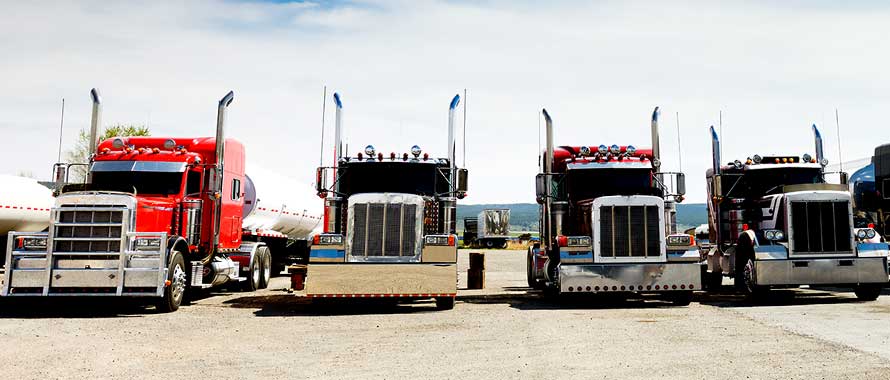Seventy percent of freight moved throughout the United States occurs on commercial trucks.1 Delivery company UPS is adding 95,000 additional workers between Black Friday and New Year’s Eve to move their 28 million packages per day – up from 18 million on a normal day.2 The Commercial Trucking industry is growing and specializing in this space can increase a broker’s book of business for the long term.
Burns & Wilcox experts Rebecca Roberts, Managing Director, and Steve Shepard, Transportation Manager, Indianapolis, Ind., shared five actionable ways brokers and agents can increase the likelihood of finding and retaining Commercial Trucking clients.
1. Knowledge will open doors
“If a broker or agent is trying to obtain more Commercial Transportation or Trucking clients they need to arm themselves with knowledge,” said Shepard.
There are two sides to this knowledge – carrier expectations and client concerns. “Understanding the priorities of each side allows the broker to place the client with the most appropriate carrier for them,” said Roberts. “For example, clients want to keep costs low, and carriers need detailed driver data and loss run history to provide accurate pricing. Knowing what both sides want will strengthen your relationships.”

Complete and high quality information makes the difference in underwriting.
To gain this knowledge, brokers and agents can start by taking educational insurance industry courses in their spare time.
2. On-the-job training
“Partnering with a specialty broker to get on-the-job training can be a priceless learning experience,” said Roberts.
Getting in touch with a specialty broker to learn the ins and outs of Commercial Trucking submissions takes commitment and is one of the best ways to learn in any industry. This trusted resource can guide brokers and agents through the process, teach them what to look for and provide key learning from their past.
“The most important part of on-the-job training is listening,” said Shepard. “Many times, people will rush through the process to simply get it done without taking a few moments to learn. Making the time now will save brokers the frustration over smaller, avoidable, issues in the future.”
3. Proper underwriting makes the process smoother
Shepard reported that poor loss results in the Commercial Auto and Trucking arena have led to increased tightening of underwriting guidelines, with insurance carriers requiring more and more information for the submission process.
Gathering data that is critical to the submission process for a Commercial Trucking policy involves a deep dive into the drivers of the trucks, including information on: turnover, dates of hire, four quarters of fuel tax records, five years of currently valued loss runs, driver employment history, motor vehicle records, and safety scores. Carriers are less likely to overlook a lack of driver data due to a trend in the high correlation of loss to poor safety scores and high driver turnover.
“Complete and high quality information makes the difference in underwriting,” said Roberts. “Approximately two-thirds of the submissions that come across my desk are incomplete.”
Shepard added, “While it may have been okay to leave out a driver’s date of hire 15 years ago, it will not pass approval on a submission today.”
Both experts stressed the granularity that insurance carriers today want on commercial truck drivers. Brokers and agents should work with the client to make sure they dig into each driver’s background for this information.
4. Invest in the client
“Making a value-added investment in a trucking company is a great way to show a client you care about their business and are not just in it for the numbers,” said Roberts.
Brokers and agents can do this by bringing in risk management advisors to guide the company towards better operations and stricter standards for drivers. Shepard said that using this approach strengthens your relationship, increases options for coverage and has the potential to lower premium.
“It is also important to look at the stability of the potential client as the quality of the account matters,” said Shepard. “Not all brokers have the luxury of hand-picking each of their clients, so taking the time to act in a consultative role can add longevity to the relationship.”
5. Stay abreast of industry trends
Brokers and agents should seek out, learn from, and educate clients on industry trends. Being well-read, attending trucking and insurance industry events, and listening to industry peers are among a few ways that brokers can stay abreast of these trends.
“One trend we are seeing right now is the hardening of pricing in Commercial Trucking insurance,” said Shepard. “While much of the industry has been softening, wheels-related businesses seem to be exempt – especially those with more hazardous exposures.”
Trends can be caused by any number of variables, so it is important that a broker or agent not lock themselves in a small bubble of news. It is a combination of reading trade and national trucking articles and being involved in the industry that will prove successful.
Finding a niche, like Commercial Trucking, is where brokers and agents generally see the most success. Retaining and growing accounts in a single market becomes easier when a broker invests their time, is trusted by their client, and is seen as an expert. When asked what the best brokers do to develop relationships with a client, Roberts simply said “They put in the time.”
References






